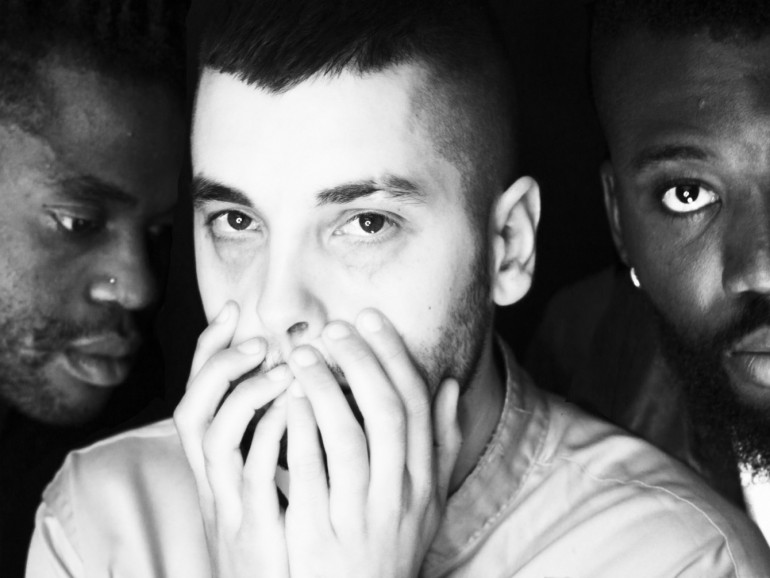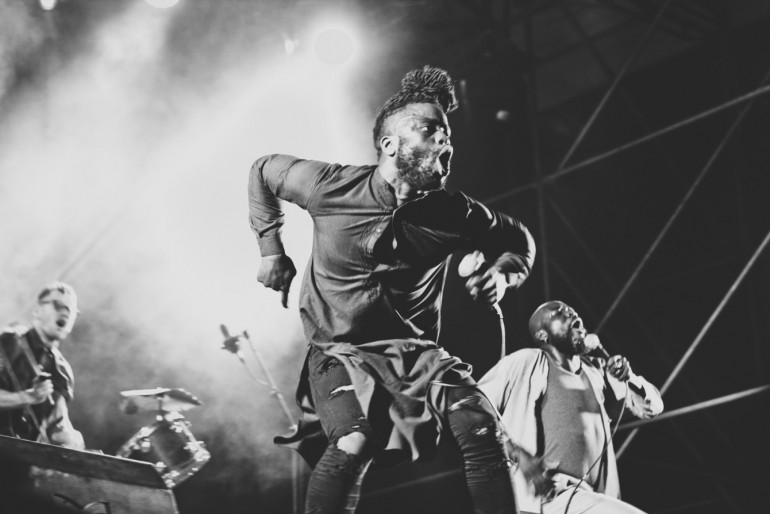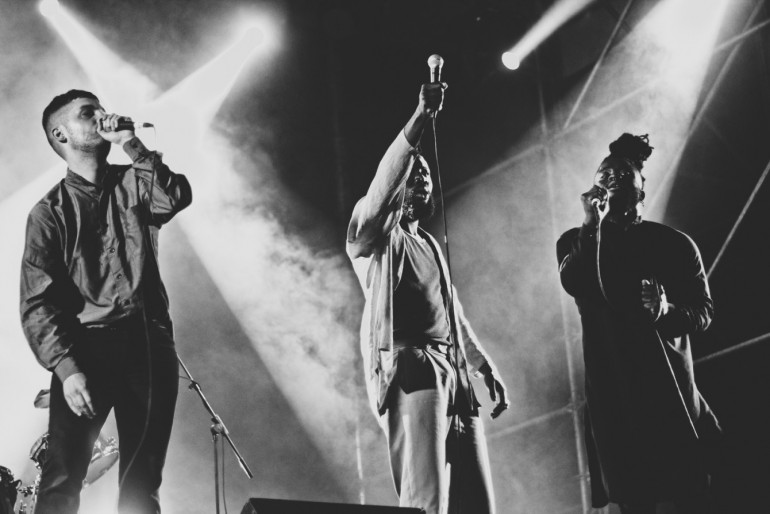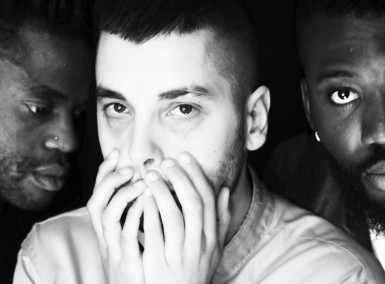
Last time NOTHING BUT HOPE AND PASSION crossed paths with YOUNG FATHERS in the dead of a Berlin winter, they were highly focused on recording a new album but had also just found out their album Dead had won the coveted Mercury Prize. Unfazed by all the attention the distinction brought, the band – who, all now at age 27, have been working together since meeting in Edinburgh, Scotland when they were just 14 – went on to complete their most ambitious and true-to-form album yet, an amazing romp of complex sound and sentiment titled White Men Are Black Men Too.
In the weeks before the album release NBHAP met up with the boys, who were a bit dazed from tour travel but nevertheless had no difficulty in lucidly describing their trajectory, intentions and the overall place of this new music within the group’s creative history. After talking with Kayus, Graham and Alloysious it quickly becomes clear that this is a conscious, big-picture band – a group who knows themselves the world they inhabit, and who rely on faith and trust in their own instincts and intuitions to drive the direction of their sound, which – as the new album proves – is still incredibly distinct and hard to pin-down.
You previewed bursts of a few songs you had been working on a few months ago which really piqued everyone’s interest here, but where have you been since then creatively in terms of how the record came into being.
Alloysious: We were moving around a lot with our ideas, so when we came to Berlin it was to just finalize everything in one place, finished.
Kayus: It was fragmented. We recorded in different places – some of it in Australia – and Edinburgh as well.
Alloysious: We decided to be away from home so we could just finish it.
Graham: Once a song is written it is just important to get the mix done and finished. We don’t really like spending a lot of time on songs. We just like getting them done and moving on.
It is hard to place you genre-wise. For lack of a better description sometimes I end up saying ‘they’re from Scotland.’
A: I don’t really have a problem with that.
K: But its not exactly true. I’m not Scottish.
So, geographically we know approximately where you guys are from but in terms of where you guys are really coming from with the content – if you were able to paint a more vivid picture of what that looks like what would it be?
G: For us – we want to achieve pop music, we want our songs to be heard, we want it to be on a platform big enough to be heard by by a lot of people. We believe that we DO make pop music even though people try to pinpoint us as being a very strange leftfield group. We think we’ve got enough hooks and melodies in the songs that people can sing along to just as much as you can sing along to anything else on the radio. It is important that people get that as well – but that we aren’t stagnant, typical pop music.
With your songs on Dead you had more of these things that were more obvious to the brain, the howling and hooks and things that stick in the head, but with the new album it seems these strange little sounds – or this howling crescendo at the beginning of ‘Feasting’, for example – it is those little things that get stuck in your head and make you think: ‘I want to hear that again’. That sort of thing is so much more evenly spread on this album.
A: The way we approached it was that we simplified everything from the lyrics and the music aspect of it to see what we needed to see in that shorter space of time, so if you are able to say all that in just four lines then that is better than saying it in eight or ten lines. That was a challenge to us. To still have the weight with the words but simplified in the pop format.
‘We need to have that sense of being uncomfortable’
The album title is quite potent. I think of you as being more of a spiritually-driven (or motivated) operation than politically?
A: Sometimes we’re in-tune and happy. Direct and definite about what we wanted to do.
A few words that come to mind in describing the new album’s sound upon first listen were: relentless, howly, crunchy, ecstatic.
A: We make up new words all the time in the studio. Like: ‘Hey, that’s LBT’ ‘what does that mean? ‘Loose… but tight!’ That’s the balance. That is what you need when you are trying to get a take. Trying to organize the chaos.
It comes across as initially being chaotic, but then your mind says: wait a sec… this is NOT chaotic… it is actually quite well-curated. As a ‘pop’ group you have placed a great amount of trust in your audience to ‘get’ what you are doing.
A: With the ‘crunchy’ ness – the vocals are quite dry, present – so it sounds: right there. Claustrophobic, I think. You’re listening to the words and it is like that. Whereas on Dead there were quite ambient sounds and reverb and all that. We try to strip everything back and simplify everything. The idea of it being more driven for example, that was from listening to the stuff on the road in America – it just repeated, repeated – it keeps driving and it lends itself for us to sing a bit more. We never thought ‘oh, we were gonna sing on this’ – it just happened. Less words and repetition.
I really enjoyed Dead, and as a consumer I looked forward to more of the same – but I found that that sort of ‘howling-into-the-night’ thing I loved about DEAD was replaced by something more subtle yet just as potent.
A: That’s what has grown. As a group together – and artistically as well. We always want to push ourselves and challenge ourselves and THAT was challenging. Our skills are being a bit more refined. It was a challenge to not over-explain. To cut things down. Not to say ‘you’ve missed this bit and this bit’ but to say: ‘you’ve said all you need to say’ and then trusting each other to say: ‘that is good enough. That’s it. That’s all we need.’ We’re all perfectionist to a degree. People are particular. People want it a certain way. But it is that trust to say: that’s fine, that’s good, that’s all we need and to move on. THAT’s hard. Then listening back after Graham had mixed it and we had a rough mix and then even after the master was done it felt glued, it felt right like: ‘Yes. This is something we feel uncomfortable about but we love it.’ That’s the difference, we NEED to have that sense of being uncomfortable – and if we don’t we just scrap the track. You need to push and you need to KEEP pushing. You need to justify.

Was there a point where you stopped freaking out about trying to overthink it? Or was that something you got out of the way?
G: We’re alright with that. We’ve been together for 13 years now. We all trust each other, we are all in-tune with each other and we are all very confident in the music that we make. We never let things like that spoil it, like about over-thinking what it means or feeling pressure or anything like that. When we are in the studio recording it feels very isolated and you don’t even really feel the presence of that at all. After years and years of doing it together you are just confident in your delivery and I think internally if we are excited about something that’s what it means; if people hate it at the end of the day the at least you loved it.
A: And you’re not going to be doing a song, thinking: ‘I’m not sure about this song…’. As well as having the courage to do that. To NOT consider yourself a ‘rapper’, to not consider yourself a singer, to just be able to consider yourself a person who does what is necessary in that track. If there’s a bit where things need to be hit – we just hit it. It is quite spontaneous and sometimes incidental – a lot of the things that happen. We try to capture that quickly from very early on because once you capture that we get a better sense of how the track actually sounds as a listener – as how you would hear it. Once we hear it over and over we can’t hear it how you hear it. That’s the frustrating thing. Allowing ourselves the opportunity to get to that point you literally have about two minutes and you can hear it, like ‘ what? this sounds like a song!’ And all of a sudden you realize: ‘oh yea, I know how that was made. I know what I was thinking. I know what I ate that day. I know happened the night before.’ It’s all those things become intertwined and that makes it seem more YOU than another piece of art…
I might have to listen to that – what you just said – all over again.
A: (laughs) To simplify it: JUST DO GREAT WORK.
There ya go: ‘WORK HARD. MAKE GOOD STUFF!’
A: Make it good and be happy with it.
And you’re happy with this album.
A: Obviously! It is the best album that we’ve done! It feels like it represents: us. Now. We’re very present. You wouldn’t want to go on tour with an album that you think is old and you just aren’t feeling it. It’s like it represents us now as well as Dead which still has some songs that we still tour with and its is blending them both – blending everything together to have a good set.
K: When we did Tape One we all considered that’s the best we ever did. Same with Tape Two after that. So we’re just growing as people and artists as well – just honing and knowing your abilities. The confidence that we have is what allows us to record the way we do. It allows us to be as instantaneous as possible and allows us to not be scared and go in with our gut to do things in the first take and not be so precious about it and worry painstakingly over it constantly and thinking: ‘Oh, I could’ve done this better. I could’ve done this in a different way. if that inflection was just a little bit different! It would’ve made it a whole different track!’ We’ve realized that the first take and the first feeling that you get when the song is being played or when you step into the studio of the room to create something it is normally the most pure.
A: This album is the crossover. The one that people are going to always go back to. Whether we move on and do other stuff – other albums – I think this is the definitive one that has a moment and surpasses ‘DEAD’ and I think that is how it should be.
‘South African music will eventually bleed itself into the rest of culture’
I don’t like asking hypothetical questions, but rather than asking any kind of influence-oriented questions I would like to ask: if you go on tour with any band out there right now then who would it be?
K: We’re having enough trouble to find a support act so that is a very hard question to answer. Most of the songs that we have got into are either from artists who have passed away or we find it hard to pronounce the name OR we don’t remember the name. At the moment we have been listening to a lot of South African music. We’ve had the opportunity to actually travel to South Africa and take something away from there, especially with how they make music – their approach is something really inspiring for everyone else. We were already on that kind of ethos. Of being not too scared to just do what the fuck you want to do and it is very clear that in South Africa that is what they do. There are scenes in South Africa, but with different scenes you have people with like-minded views, but out there it is a scene except it seems like they all have different views and they jump in and out of all these different scenes and it feels very diverse and that is what is lacking in any other place.
It happens here, too. There are whole worlds you don’t know about.
K: Yes, you just tie yourself off…
G: I think South African music will eventually bleed itself into the rest of culture.
K: People are bored.
G: Anywhere where they are SO far ahead… I mean, I can already hear it – that in post production they have taken rhythms from stuff that was made in South Africa. To me the artists there are just as chart-worthy and radio-worthy as any artists over here. They have great songs – so strange. Maybe because they’re in a different language, but…
K: They’ve realized that they are ready. That’s why their radio stations are so fucking diverse. They play South African music. They play rock and hip hop and all sorts of genres on the same station.

What do hope and passion mean to you?
A: A sense of freedom. A sense of awareness – of BEING something else – something that is not mundane. A way to express yourself in any form. You’re holding on to something, you know – and you’ve go the fire burning to realize – to dream whatever you are dreaming. I think hope and passion is the catalyst of most things.
G: When I was 11 years old I walked into the kitchen and I told my mom I was going to be a rapper.
Did she freak out?
G: No, she just laughed and said ‘eat your dinner’, but I remember it because I had just been listening to Tupac’s Greatest Hits for one of the first times, and I remember just listening to it on repeat for hours and hours and my whole world opened up and I thought: ‘I want to do something like THAT.’ He had melodies and a conscience. When I was growing up it was hard to find a friend who wasn’t racist or a friend who was kind of conscious of the world, so when I heard a person who was cool talking about things that I liked, I thought: well, I could do that. For me that was hope and passion. I just remember telling my mum and she just laughed and then I just started making music after that. It’s funny. Hope and passion can come from these weird places… I don’t even listen to Tupac anymore, but that album changed my life and meeting these guys changed my life. I wanted a way to express myself, but in the circle of people where I grew up you’d just… get the shit kicked out of you. When I met these guys and I say that you could be accepted as someone who can dance or sing or whatever – that was a whole different world. Hope and passion lead you to find another world. If you want to be a part of if you have to go FIND it. You can’t just sit and expect it to come to you.
A: You have to have the courage as well, and be open to anything – that’s where it lies as well – not being scared about what you want to do.
K: Hope and passion is the journey to being free, where things no longer become a burden and weigh you down. The aspiration to get to that point.
‘Everything happens for a reason’
How difficult was it for you guys to get going and do what you ended up doing where you were?
A: Luckily we started young. You find out what you want to do and you listen to your parents’ records and stuff at school, and then you try stuff. You get better at writing songs. You do your three, four, five years – get good, and then all of the sudden it all comes together.
G: It took years. It took listening to people and then realizing that if we wouldn’t have listened to them then it would’ve never gotten to the point where we were fed-up and then we did Tape One. So it is a cliche: everything happens for a reason. It is hard to be angry at the years we’ve spent being so fucking young and hopeful and thinking that things were simple and that you can just fall into the music market and get everybody’s ears – that you can just put your stuff on the internet and everybody will hear it. Sometimes years of that were hard, but if it wasn’t for that we wouldn’t be where we are. And you have to get insight into the industry and how it works as well.
K: It is super cliche to say everything happens for a reason, but things do happen so that you learn from them.
G: You could easily see a band or anybody else going through what we’ve gone through with people – years and years of being told: ‘just do it like this and you will make it eventually – you’ll make some money next year, you’ll make some money next year.’ You can easily see loads of people say: ‘fuck this, I’m not doing this anymore.’ For us that is why Tape One means so much to us because it was literally a life saver.
K: That pushed us forward from forward to create our own artwork. To do our own videos.
You guys do those yourselves?
A: Yea, it is just us passing the camera around. Graham sometimes helps to edit the stuff, but we talk about maybe what we want to do, and what we want to capture or sometimes we just go and see what happens. No one has been trained, but I think we’ve got a good eye for seeing what is good.
G: Its like anything really- you can go pick up a camera or you can go be a singer, but if you have no fucking taste you’ll never go anywhere, you know? Taste is vital. Some people have it and some people don’t. I think we have taste and a strong aesthetic but we just have a strong opinion of things and with the videos we always just want to capture humanity in its simplest kind of form. You’ll set up a take, you’ll put the camera on a tripod and you record someone doing something that you planned but usually what we take are the bits in-between when they don’t know they are being recorded.
A: It’s like you are watching it and everything seems really polished the world seems really polished, and thein there is an instant where someone is exposed or something seems out of the ordinary – a bit normal – but real. That is when you go: ‘Ah!’ That is when it looks good. It is really effective. We have realized that in the process of getting people to do earlier videos – we just picked up the camera not thinking ‘we have got our hands tied because we don’t know how to do it’, we just thought: well fuck it, we’ll just have to do it ourselves!
On the one hand you are at a time when the industry has changed while you’ve been in it – on the other hand you can just make your own videos. That was once a rare amount of creative control. Well, gentlemen, thank you for your time and for pouring yourselves into the answers to all these questions. I look forward to seeing you live.
ALL: Cheers! We’ll be back around Berlin in the summer.
—



